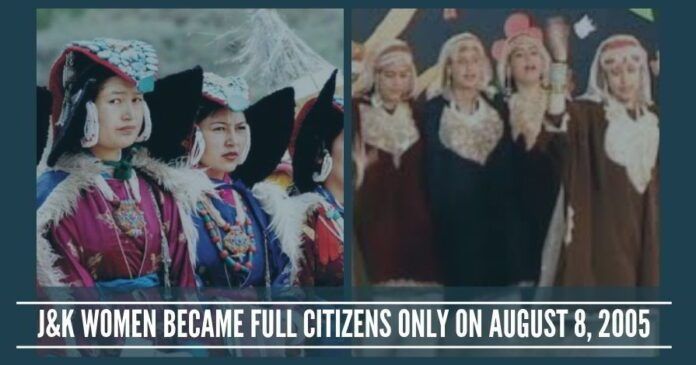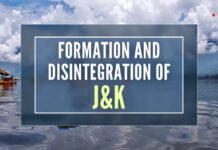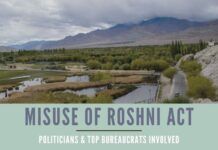
The Mufti Mohammad Sayeed-led PDP & Congress coalition government didn’t implement the court verdict.
It was in 1979 that Dr Susheela Sawhney knocked at the doors of the Jammu Bench of the Jammu and Kashmir High Court, to challenge the appointment of Dr Ravinder Maadan (LPA (sw) No. 27/79 C/W LPA No. 24/79). Dr Maadan had been selected as Assistant Professor in the Department of Obstetrics and Gynaecology, Government Medical College, Jammu. Dr Sawhney, who was then working against that position on an ad-hoc basis, had also applied, but she was not selected. Dr Sawhney challenged the selection of Dr Maadan on the ground that “she was married to a non-State Subject”. The single judge quashed the order of appointment of Dr Maadan. Thereafter, Dr Maadan appealed against the single judge’s verdict.
The High Court took as many as 23 years to dispose of the case. The full bench delivered its landmark verdict in October 2002 that granted full citizenship to J&K women married outside Jammu and Kashmir with non-state subjects. The full bench consisted of Justices V K Jhanji, T Doabia and M Jan.
The historic judgement of the full bench delivered on 7 October 2002 read: “In view of the majority opinion, we hold that a daughter of a permanent resident marrying a non-permanent resident will not lose the status of a permanent resident of the state of Jammu & Kashmir”.
In between, many other women of the state adversely affected by the 1927 State Subject Laws (adopted during the time of Maharaja Hari Singh) had approached various courts in the state. Some of them were: Harjeet Singh vs. Amarjeet Kaur (Civil Revision No. 1277 80), Dr Abha Jain (OWP No. 166/85), Anjali Khosla (OWP No. 171/96), Kamla Rani (OWP No. 191/92), Dr Reeta Gupta (OWP NO. 520/94), Dr Rubeena Nassarullaha (OWP No. 152/1985), and Shruti (SWP NO. 650/98).
They were all married to non-state subjects and had been declared non-State subjects by the concerned authorities.
The reference to the full bench was: Whether the daughter of a permanent resident of the state of Jammu and Kashmir marrying a non-permanent resident loses her status as a permanent resident of the state of Jammu and Kashmir, to hold, inherit and acquire immovable property in the state? Another reference to the full bench was: Whether the daughter of a permanent resident of the state of Jammu and Kashmir loses her status as a permanent resident of the state of Jammu and Kashmir on her marriage with a person, who is not a permanent resident of the state of Jammu and Kashmir?
The historic judgement of the full bench delivered on 7 October 2002 read: “In view of the majority opinion, we hold that a daughter of a permanent resident marrying a non-permanent resident will not lose the status of a permanent resident of the state of Jammu & Kashmir”.
Sadly, however, the Mufti Mohammad Sayeed-led People’s Democratic Party and Congress coalition government didn’t implement the court verdict. Instead, it got passed by voice vote as the Permanent Residents (Disqualification) Bill 2004, commonly known as the Daughters’ Bill, on 5 March 2004. The Bill sought to deprive daughters of permanent residents of Jammu and Kashmir of their permanent resident status, and the rights and privileges associated with it, if they chose to marry persons who were not State subjects. The Bill created a furore in Jammu and Ladakh with the then Bharatiya Janata Party opposing the Bill tooth and nail and making it a big issue against the Congress.
It may appear unbelievable and ridiculous, but it is a fact that the Mufti government didn’t pay any heed to the verdict delivered by justices Jhanji and Nargotra.
There were loud clamours in Jammu for the withdrawal of the Permanent Residents (Disqualification) Bill 2004. Ultimately, the atrocious anti-women Bill was shelved under pressure from Jammu.
But the shelving of the Bill brings no relief to women of the state who were married to non-state subjects, as the authorities continued to issue state subject certificates to the daughters of the state, making an endorsement of “valid till marriage” on such certificates. It was contempt of court and a gross violation of the full bench verdict, which was unambiguous.
The same year, this writer filed a Public Interest Litigation (PIL) in the Jammu and Kashmir High Court, Jammu Bench, (PIL No. 1002/2004 and CMP No. 1089/2004). The PIL was heard by a two-judge bench comprising Justices VK Jhanji and Y P Nargotra. The bench was kind enough to consider the points I had made in my PIL. It delivered its judgement on 9 September 2004.
The operative part of the judgement read like this: “It is contended that respondents (Jammu & Kashmir government) are continuing to make an endorsement of ‘Valid Till Marriage’ on the state subject certificates issued to unmarried daughters of state subjects. The respondents are, therefore, called upon to explain why the rule under the Jammu & Kashmir Contempt of Courts Act be not issued against them for not following the judgement declared by the full bench of this High Court in State of J&K & others vs Dr Susheela Sawhney and others. 2002 PIL 282, whereby endorsement of ‘Valid Till Marriage’ on the state subject certificates of unmarried daughters of state subjects has since been struck down. In the meantime, respondents are directed not to make any endorsement of ‘Valid Till Marriage’ on the state subject certificates issued to unmarried daughters of state subjects”.
It may appear unbelievable and ridiculous, but it is a fact that the Mufti government didn’t pay any heed to the verdict delivered by justices Jhanji and Nargotra. Instead, the revenue department of Jammu and Kashmir government issued a circular No. Rev (LB)87/74 on 01 January 2005 to the “competent authorities” asking them to lay down a new condition while issuing state subject certificates to unmarried daughters of Jammu and Kashmir.
The circular read: “Consequent upon the judgement of the Hon’ble High Court on the subject, the Law Department was requested to give its opinion regarding the procedure to be adopted in respect of issuance of the permanent resident certificates to the daughters of the permanent residents of the state. The Law Department has in the matter opined as under:
he fight is still not over, as children of daughters of Jammu and Kashmir married to non-state subjects can’t inherit their mothers’ properties located in Jammu and Kashmir.
‘The certificate may be re-issued after marriage to indicate if the lady has married a state subject or non-state subject’.
It is, therefore, enjoined upon all concerned competent authorities to ensure that the advice tendered by the Law department as reproduced above is implemented in letter and spirit in so far as issuance of permanent resident certificates to daughters is concerned”.
As a result, this writer again filed a PIL (WPPIL No. 1002/2004 (COA(PIL) No. 2/2005) seeking contempt proceedings against the Jammu and Kashmir government. Justices Jhanji and Parmod Kohli heard the case and issued a notice to S Biloria, then chief secretary to Jammu and Kashmir government and others.
Fearing contempt proceedings, the Jammu and Kashmir government withdrew its nasty circular and informed the two-judge bench on 8 August 2005 that it had withdrawn the circular. It was justices V K Jhanji and Nargotra who, on 8 August 2005, disposed of the case, saying “the grievance of the petitioner (read this writer) stands redressed and, therefore, this PIL, as well as the contempt petition, are disposed of, having been rendered infructuous and rule, if any, issued is discharged”.
This was how daughters of Jammu and Kashmir married to non-state subjects obtained full citizenship rights. However, the fight is still not over, as children of daughters of Jammu and Kashmir married to non-state subjects can’t inherit their mothers’ properties located in Jammu and Kashmir. They, like Hindu-Sikh refugees from Pakistan and members of the Valmiki Samaj from Punjab living in Jammu for seven decades, are considered non-state subjects. They have no right to property, state government jobs, education in state government and state government-aided educational institutions, vote in the assembly and local body elections, bank loans and so on.
They have approached the Supreme Court of India seeking abrogation of Article 35-A, saying it is unconstitutional, discriminatory and against the basic structure of the Indian Constitution. This Article was inserted in an appendix of the Indian Constitution on 14 May 1954 without taking the Parliament into confidence. But more than that, it was applied to Jammu and Kashmir w.e.f. 14 May 1944, when the state had not acceded to the Indian dominion.
Note:
1. The views expressed here are those of the author and do not necessarily represent or reflect the views of PGurus.
- ‘Kashmir My core constituency’: Revisiting July 12, 2003 to understand politics, Omar Abdullah-style - March 15, 2024
- Total deviation from traditional approach: Seven takeaways from PM Modi’s March 7 Srinagar visit - March 9, 2024
- Status of political parties: Why is further J&K reorganization imperative? - March 1, 2024










